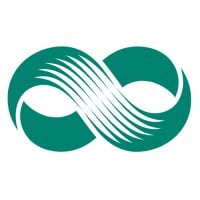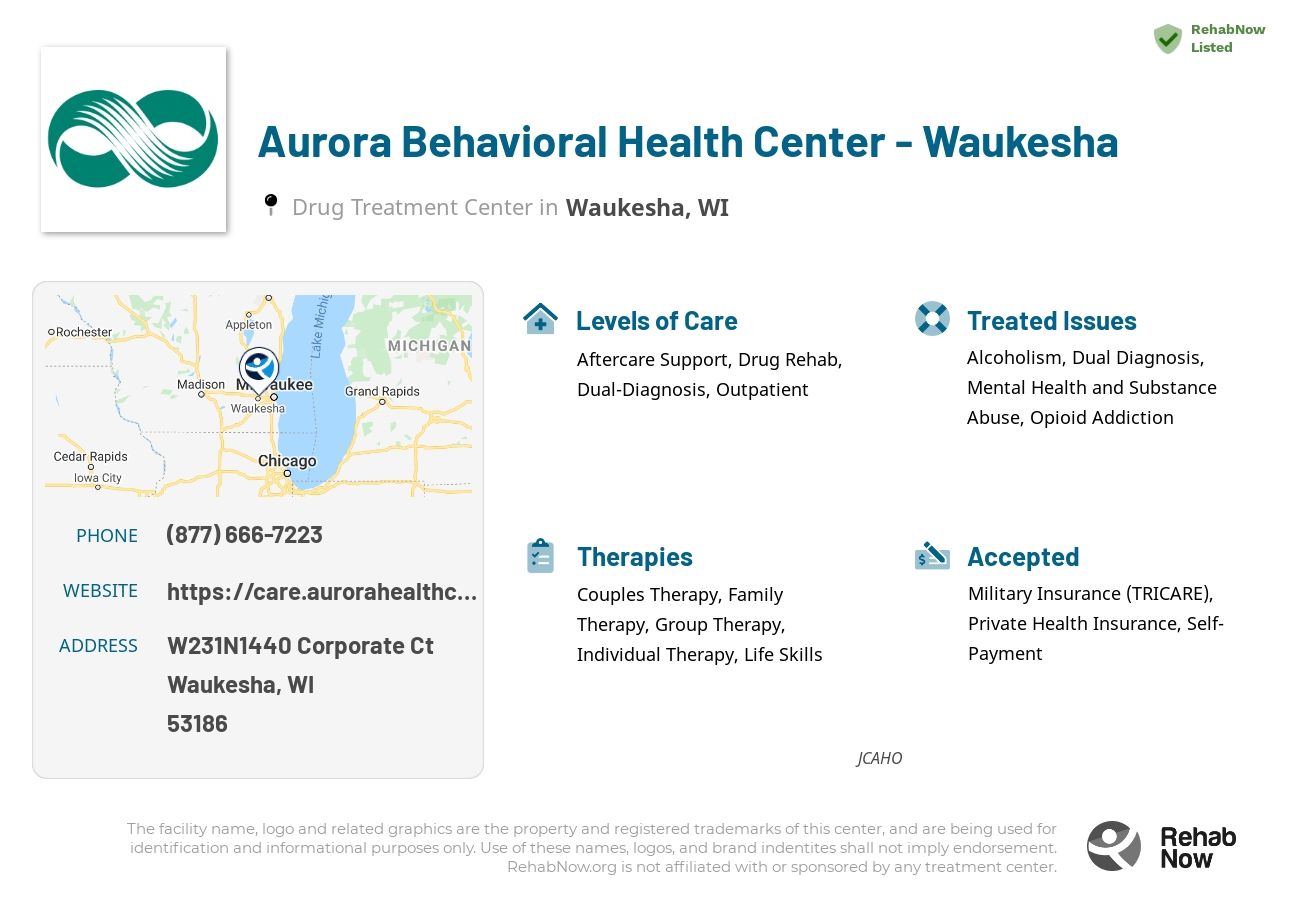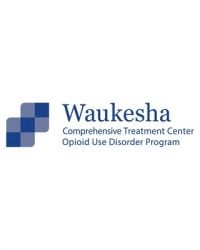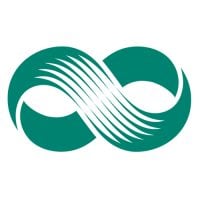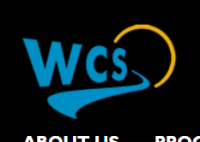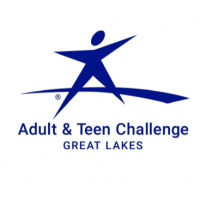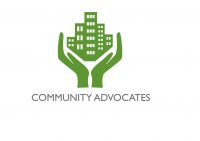Aurora Behavioral Health Center - Waukesha
Drug Rehab Center in Waukesha, Wisconsin
The Aurora Behavioral Health Center - Waukesha is an accredited addiction treatment facility offering a range of care levels, including Aftercare Support, Drug Rehab, Dual-Diagnosis, and Outpatient Levels of Care, and accepts most private health insurance plans.
About Aurora Behavioral Health Center - Waukesha in Wisconsin
Aurora Behavioral Health Center, situated in Waukesha, WI, stands out as a non-profit rehabilitation facility focusing on Mental Health Disorders and Substance Addiction. Renowned for its comprehensive outpatient services, the center tenderly addresses the needs of individuals, couples, and families, delivering therapy and support tailored to each client’s unique circumstances.
Accredited by the Joint Commission on Accreditation of Healthcare Organizations (JCAHO), Aurora Behavioral Health Center prides itself on its evidence-based treatments. The facility accepts private health insurance, making its wide array of therapeutic approaches more accessible to those in need.
- Offers a variety of treatment approaches, including cognitive-behavioral therapy (CBT) and family therapy, catering to individual recovery needs.
- Specializes in both addiction and mental health issues, providing a holistic approach to recovery.
- Provides aftercare support and various outpatient programs, ensuring continuity of care for long-term recovery.
Targeting specific addictions and issues such as substance use disorders, anxiety, depression, and more, the center employs methods like group therapy, individual therapy, and life skills coaching. With levels of care ranging from partial hospitalization to intensive outpatient, Aurora Behavioral Health Center is equipped to support individuals through every step of their journey towards sobriety and mental wellness.
Genders
Ages
Modality
Additional
Accreditations

JCAHO
Conditions and Issues Treated
Opioid addiction starts when a person becomes addicted to legal or illegal opioids. The addiction can happen quickly, in just a matter of days. Opioid withdrawal can be extremely uncomfortable and lead the user to continue to use even if they want to quit. Stopping using an opioid requires medical observation. Sometimes inpatient treatment with a medically supervised detox is necessary for managing the withdrawal process while learning lasting tools for maintaining recovery. Medications may be used in some cases of opioid addiction.
Opioid addiction is one of Wisconsin‘s most prominent forms of addiction. It’s treated by detoxifying the body so that the chemicals from the medications no longer impact them and by therapies to correct behavior and target the root of the problem.
Recovery is not simply about stopping drug use. Recovery is working with addiction while recovering mental health issues that are fueling the addiction in the first place.
Levels of Care Offered
This center offers a variety of custom treatment tailored to individual recovery. Currently available are Aftercare Support, Drug Rehab, Dual-Diagnosis, Outpatient, with additional therapies available as listed below.
Outpatient treatment is considered the lower intensity level of addiction treatment. It’s ideal for early phase addiction or lower intensity addictions. It may include weekly sessions instead of daily. It may include weekly sessions instead of daily. Peer group support, 12-step programs, and individual counseling may still be involved but at a lesser frequency than an intensive outpatient program. It is a good choice for someone who doesn’t need to go through a medically supervised detox and who has a supportive home environment. It requires motivation and dedication to commit to the program without constant monitoring.
Aftercare support should take place after outpatient treatment has ended. There are a few different types of aftercare support that patients can seek. These include 12 Step, Self-help groups (AA, NA), Therapeutic communities, Long-term, structured sober living arrangements, and Halfway houses (residential treatment centers).
Therapies & Programs
Individual therapy involves one-on-one sessions between the patient and therapist. It provides patients with a safe environment to openly discuss personal and sensitive issues with the therapist. They find the therapist as someone they can trust. Individual therapy aims to identify the core issues that would have led the patient to substance abuse and address them effectively. The therapist can develop patient-specific customized solutions through individual therapy, which aids speedier recovery.
Couples therapy works with clients and significant others in a professional capacity to improve relationship dynamics. This can be helpful for addicts who are trying to marry the idea of recovery into their work, family, social lives – any aspect that has to do with relationships.
Through counseling sessions, addicts will have an opportunity to talk about their addiction with professional partners. These partners can offer feedback and advice on how to get sober while keeping healthy relationships intact. A good couples therapist will help addicts understand their part in an unhealthy relationship dynamic or find ways to deal with anger or resentment from significant others outside of the home.
Family therapy is a group problem-solving that aims to improve communication and relationships between the addict, their family, and sometimes friends. The main goal of family therapy for drug addiction is to create an environment where communication can occur without judgment, hostility, or blame. The therapist is with the family as they learn to communicate differently, especially with the addict when s/he is using. The family can learn to reduce their enabling behavior or rally together and support each other during tough times.
An addict’s family can play a vital part in helping them to avoid relapse because they can spot the warning signs and help them get back on track before it becomes too much of a problem. Family therapy is one of the most effective ways to help addicts stay on the path to long-term sobriety. When a drug addict decides that they want to try and get sober, it takes the support of every person they love to succeed. It can be incredibly difficult for loved ones to watch an addict go through the pain and suffering of withdrawal, but by being there with them and supporting them, they can help to make sure that the addiction never returns.
Groups typically involve meetings with other recovering addicts who can relate to one another’s experiences. They might meet in person or online and typically focus on the process of staying sober rather than overcoming a specific addiction.
In these groups managed by Aurora Behavioral Health Center - Waukesha, addicts can build a sense of community and develop strong emotional connections with others who understand what they are going through. These beneficial relationships can help addicts overcome their cravings and prevent relapse at any point during the recovery process.
Since addiction is a chronic physical and mental illness, addicts need to learn as many life skills as possible. Many drug treatment centers offer life skills activities as part of their addiction recovery programs. Examples include cooking classes, employment training, resume writing seminars, parenting classes, and computer training. Life skills activities help addicts find employment, take care of their families, and give back to the community.
Payment Options Accepted
For specific insurance or payment methods please contact us.
Is your insurance accepted?
Ask an expert, call (888) 674-0062
Aurora Health Care Associated Centers
Discover treatment facilities under the same provider.
- Aurora Sheboygan Memorial Medical Center in Sheboygan, WI
- Aurora Behavioral Health Center - West Allis in Milwaukee, WI
- Aurora Behavioral Health Center - Delavan in Delavan, WI
- Aurora Medical Group in Oshkosh, WI
- Aurora Behavioral Health Center - Neenah in Neenah, WI
Learn More About Aurora Health Care Centers
Additional Details
Specifics, location, and helpful extra information.
Waukesha, Wisconsin 53186 Phone Number(877) 666-7223 Meta DetailsUpdated April 15, 2024
Staff Verified
Aurora Behavioral Health Center - Waukesha Patient Reviews
There are no reviews yet. Be the first one to write one.
Waukesha, Wisconsin Addiction Information
Wisconsin has some of the highest rates in the United States for both adolescent and adult substance abuse. Since 2009, the state has been experiencing the same escalating rates of drug abuse and addiction as the rest of the country. The major concerns are the misuse of prescription painkillers and the escalating number of deaths due to alcohol-related liver disease.
The drug addiction problem in Waukesha, Wisconsin, is fairly bad. Around 9.4% of people in Waukesha, WI, abuse drugs, and around 5.6% abuse alcohol. Drug addiction can lead to criminal activity, job loss, financial instability, and social isolation. The most common types of treatment available in Waukesha, Wisconsin, are inpatient, outpatient, and residential.
Treatment in Nearby Cities
- Siren, WI (279.7 mi.)
- Delafield, WI (9.8 mi.)
- Fort Atkinson, WI (32.8 mi.)
- East Troy, WI (20.8 mi.)
- Boscobel, WI (126.2 mi.)
Centers near Aurora Behavioral Health Center - Waukesha
The facility name, logo and brand are the property and registered trademarks of Aurora Behavioral Health Center - Waukesha, and are being used for identification and informational purposes only. Use of these names, logos and brands shall not imply endorsement. RehabNow.org is not affiliated with or sponsored by Aurora Behavioral Health Center - Waukesha.
